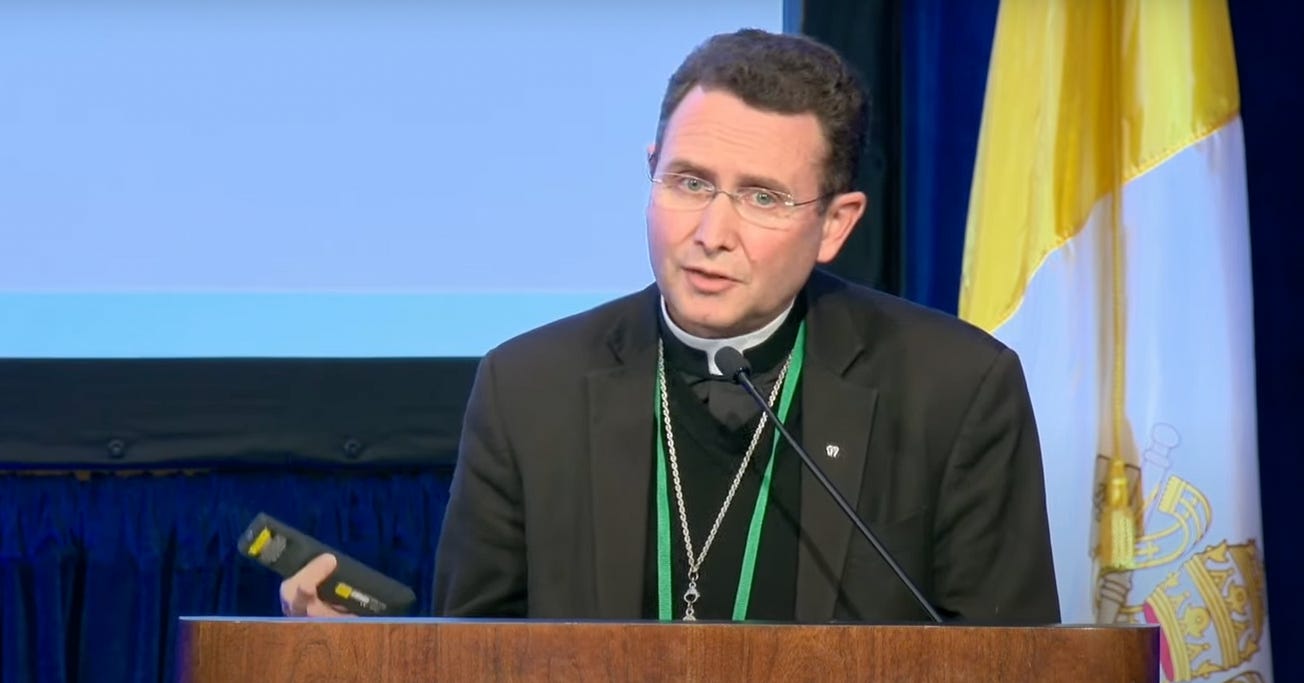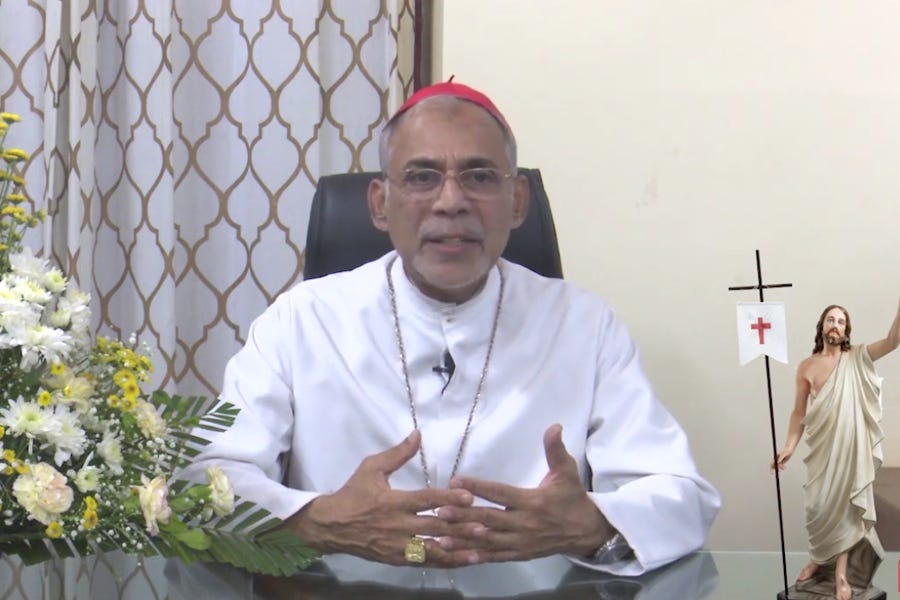Happy Friday friends,
And a reminder on this feast of Our Lady of Fatima that the bishops of the United States have asked all Catholics to pray the rosary today, given the strong possibility that we could soon see the overturn of Roe v Wade.
As we’ve discussed before, the prospect that real limits on abortion could soon be possible in many states would be a serious win for the cause of life in this country. Not only would it save individual lives in the immediate term, I am also convinced that the end of Roe (and Casey, for that matter), will be ultimately healthy for our national politics — though I accept it won’t be so in the very near future.
JD wrote on Tuesday that the possibility that pro-abortion vandalism and demonstrations at Catholic churches will spill over into violence is real. Some have suggested this is hyperbolic, even scaremongering, but I disagree.
Living as I do in Washington, I have had many chances to see pro-life and pro-abortion demonstrations up close, often side-by-side. This is anecdotal, I grant you, but it has been my universal experience that those protesting the evils of abortion outside, for example, the Supreme Court, have been faultlessly cheerful, positive, and full of hope. Conversely, pro-abortion demonstrations often, in my experience, been angry, confrontational, and involved the hurling of abuse — and other things, too.
The roiling sense of aggression is often palpable among the “pro-choice” crowds, which often contain an especially unpleasant element of young men who seem to be there expressly for the sport of confronting young pro-life women and calling them vile names at the top of their voices, often goaded on by others in the crowd. Not infrequently, I’ve seen this same goading lead to the throwing of various objects, usually water bottles, at or towards pro-lifers.
Given the expressly threatening tone being taken at just the prospect of a Supreme Court decision (“If abortion isn’t safe, neither are you,” as one vandal put it recently) the prospect that one of these people will pick up a brick instead of an Evian bottle seems entirely possible.
Unfortunately, I’m sure we will have to come back to the issue of abortion law and political violence, but let’s leave that to one side for the moment.
—
As I said here last week, in the event of a court decision ending Roe, the debate will shift back to the state level and local Catholic conferences, agencies, and charities will need to adjust hard and fast to different circumstances.
This week, Matt Hadro took a look at what some state Catholic conferences are already doing to prepare for a post-Roe world. They have a full slate of projects.
Whether it's about shifting to oppose state laws trying to create “havens” for abortion up to the moment of birth, or pivoting lobbying and financial resources to supercharge support for expectant mothers in states with trigger bans, there is a lot of work to be done, and not a lot of time to get ready. Fortunately, in many places it looks like state Catholic conferences are ahead of the game.
—
Of course, the really big news of the week was the arrest in Hong Kong of Cardinal Joseph Zen on charges of “collusion with foreign powers”.
On Thursday, the Diocese of Hong Kong put out its own statement, expressing “extreme concern” for Zen’s “condition and safety.” “
We have always upheld the law,” said the diocese. “We trust that in the future we will continue enjoying religious freedom in Hong Kong under the Basic Law.”
The diocese may trust, but I’m not able to verify they will on the available evidence.
Zen’s arrest triggered a lot of media shock in the West but, to the extent that they care at all, I suspect Chinese authorities are betting it will be short lived. Catholics in Hong Kong, at least the ones I have spoken to, meanwhile are dismayed — and fiercely concerned about Zen’s welfare — but not surprised.
Several told me that Beijing has been clear enough that Zen’s continued freedom has long been considered a symbol of defiance in the face of the electoral reforms, “patriots only” rules, and civil liberties crackdowns brought into Hong Kong over the last two years.
The timing of Zen’s arrest (and that of several other prominent board members of the 612 Humanitarian Relief Fund) is not accidental, coming the week after the “election” of John Lee as Hong Kong’s next chief executive. The local message is clear: no one is off-limits to the national security apparatus.
Fast forwarding to the end of Zen’s legal process, whenever that may be (and my guess is not until the Vatican has renewed the agreement for another two years), should the cardinal be convicted Rome will find itself in a very tight corner indeed.
If the Vatican denounce Zen’s imprisonment as the obvious state persecution of a 90 year old religious leader, and a naked assault of what little remains of civil liberties in Hong Kong, they can expect Catholics on the ground to suffer for the CCP’s displeasure.
But if Rome accepts, even through silence, Zen’s conviction and jailing, it will send a message to every bishop in China — Hong Kong and the mainland — that they are on their own. And that would be a real win for Beijing.
You can read the whole analysis here.
—
Zen is not, of course, the first cardinal to face prison, and the history of jailed, arrested, and indicted cardinals in the Church is long and varied.
Many cardinals have ended up in jail for defending the freedoms of the faith, including in China. Others, like Cardinal George Pell, have found themselves wrongfully imprisoned for supposed civil crimes they never committed.
And since we’re talking about cardinals with legal troubles, Pillar reader Angelo Cardinal Becciu also makes an appearance.
This Friday Pillar Post is brought to you by the University of Dallas, “The Catholic University for Independent Thinkers.”
The University of Dallas invites you to check out their free 5-episode video series “The Quest,” available at udallas.edu/pillar.
One of the recurring themes of pastoral engagement in the Church is how to welcome and minister to people with same-sex attraction. It is, put very mildly, a sensitive topic in the Church.
Many Catholics — including people in the pews, pastors, and bishops — aren’t sure, or disagree strongly strongly about what language to use when talking about people who consider themselves LGBT.
It is an interesting conversation about the difficulties many such people have in “feeling at home” even if the Church does “feel like family.” All too often, Carter says, there is a default to an “LGBT paradigm,” both in and out of the Church, which needs to be reframed.
“In contrast to the secular space, it’s important to reframe the ‘givenness’ of our creation, mysterious though it may be, and the moral imperatives that come with that. In contrast to generalized fear, it’s important to remember that every LGTBQ person is a human being.
There’s no one single definition of the “LGBT paradigm,” but we consider it in two contexts. One is the worldview promoted in a secular LGBT space—one that diverges from the Catholic approach to anthropology and sexual morality. The other is what mainstream Catholics generally think the secular LGBT space is promoting. A reframe is needed for the LGBTQ disciple in both spaces.
—
Two senior writers and speakers resigned this week from Word on Fire, the media apostolate founded by Los Angeles auxiliary Bishop Robert Barron. Jackie and Bobby Angel, a married couple, both quit as fellows at Word on Fire May 9, adding to mounting criticism of the organization’s structure and culture.
“We believe in the mission and the principles of Word on Fire, but not at all costs, and definitely not at the expense of our mental health,” they wrote in their resignation letter, obtained by The Pillar.
“Any ministry that speaks truth with love will receive spiritual attack, but it is poor leadership, communication, and organizational principles that brought us here.”
The Angels’ departure, and criticism, follows the public controversy over WoF’s handling of an investigation into alleged sexual assault on the part of a former senior producer, who was fired in October 2021. The allegations came to light in late April, in a post from Catholic writer Chris Damian.
We spoke to half a dozen current and former employees at WoF, who all expressed, more than anything else, sincere discouragement at what they see as problems in a leadership culture which didn’t listen to concerns and played favorites.
“It feels to me almost exactly like how the Church has handled things [in recent decades], and it has failed. And that worries me a lot. Because we encouraged the Church to get out there, hold yourself accountable, and it’s just not happening,” one of them told us.
As I have said before, it’s a complicated situation, but the disparity of cultural and generational expectations around issues of transparency and accountability seems very real - and it seems that Word on Fire is now facing some of the same issues that dioceses and religious institutes have faced in recent years.
You can read the whole story here.
—
—
So, a priest walks into a bar, talking his way into a night of dinner, drinks, and a free place to stay with an elite British Army infantry regiment guarding the Queen’s official residence, and then triggers a sweeping military review of royal security. Heard this one before? I thought not.
The British press covered this security breach and the fallout investigation heavily, but just reported that a man “pretending to be a priest” and calling himself “Fr. Cruise” had crashed the guards’ barracks for the night and been removed by the police the next day.
Well, let’s just say we got curious. And The Pillar got the facts on this one.
Fr. Kruse reportedly got into the barracks by claiming to be a friend of the regiment’s chaplain and to have served in Iraq. While the soldiers apparently enjoyed his company throughout the evening, their suspicions were raised when his claims became increasingly outlandish — at one point he told them he was an ejector-seat test pilot.
Kruse had, it seems, previously turned up in a local pub claiming to be a friend of Prince Harry and asking for a free meal. I myself wouldn’t admit to being friends with that shirking dilettante if it meant free meals for life, but I digress.
Social media posts by Kruse in the weeks leading up to his trip to England paint an increasingly erratic picture — with the priest posting pictures of letters to his bishop asking to move to London and excardinate to the Diocese of Westminster. Other posts seem to show him claiming to be some kind of chaplain or confessor to the royal family.
The Diocese of Spokane confirmed for us yesterday that Kruse was a priest of the diocese and emphasized that “what he did was not a crime.”
The diocese added that officials are “addressing” Kruse’s situation and, the vicar general told us, “we are just praying and hoping he can get the help that he needs. Because he is fundamentally a good man.”
The diocese told us that Fr. Kruse has been committed, with some diocesan help, for some psychological evaluation, and asked prayers for the priest.
To France with love?
As regular readers know, I’m something of a devotee of television which is bad enough to be funny. Ordinarily, my taste runs to the blind date/instant marriage reality genre, or what I like to call “annulment true crime,” but my wife has been convalescing this last week and, wanting something lighter, we stumbled upon a delight I wanted to share.
UK TV is famous for turning out riffs on “murder in a nice bucolic setting”, but Death in Provence is something else again.
It is, as the name might suggest, a light hearted murder mystery-of-the-week show set in Aix. I warmed instantly to it because, being set in France, they have an inquisitorial rather than adversarial legal system — as in canon law — so a judge takes the role as lead detective.
But what elevates the show is the all-English cast and sensibility, despite the whole thing supposedly being about French people in France.
The effect is riotous. They spice their dialogue with hilarious accents on seemingly random words, the detectives conduct all their meetings and interviews over wine, and freely discuss the details of their murder in casual gossip with lovers, friends, neighbors, and witnesses.
In every case, adultery is universally presumed among the deceased and suspects, but never considered as a motive, and all the characters call their parents by their first names and joke about how gauche it is to tell someone you love them.
The set design, apart from swapping brasseries and cafes for offices, which French people apparently never go to, mostly consists of small coffee cups, strings of garlic, and platters of oysters everywhere. And the joyful thing about it is, I honsestly cannot decide if this is all meant sincerely, or as satire.
I’d pay real money to watch a French inversion, with a cast of Parisian TV regulars trying to capture the manners of the English middle class in Oxford. I suspect it would be withering.
See you next week,
Ed. Condon
Editor
The Pillar








